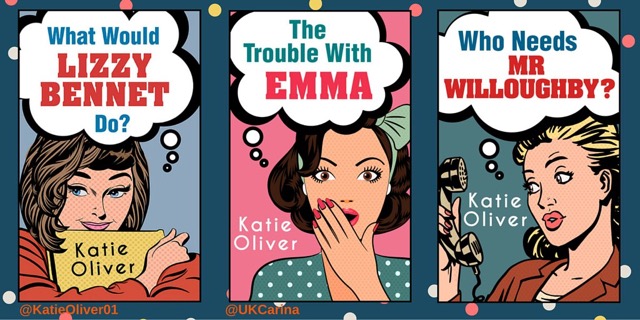Author Katie Oliver discusses the enduring popularity of Jane Austen, and the one thing all classic novels have in common.

Pride and Prejudice was written in 1813. Two centuries ago...and yet Austen's story of Elizabeth Bennet and the prideful Mr Darcy is as popular and relevant today as it was in the early 19th century. Numerous film adaptations have come and gone, from the 1940 version starring Greer Garson and Laurence Olivier to the 2005 film with Keira Knightley and Matthew Macfadyen.
What is it, exactly, that keeps us coming back to Jane Austen’s novels?
Well, we know we'll enjoy a lively exchange of witty retorts, droll observations, and clever put-downs in the pages of her books. We know we'll be privy not only to romance, but hypocrisy, and arrogance, and every sort of human failing in between - from Mr Wickham's unapologetic seduction of underage girls, to Darcy's rudeness, to Mr Collins' ridiculous snobbery - and it keeps us intrigued and entertained in equal measure.
Because human nature is no different now than it was then. There's still a social pecking order, there are still people who fancy themselves superior due to their wealth, social status, education, or the car they drive. People are every bit as arrogant, as prejudiced, and as devious as they were during the Regency period (perhaps, dare I say it, even more so.)
We can relate to the very same irksome things that troubled Elizabeth Bennet and Fitzwilliam Darcy. Rudeness? Preconceived notions? Prejudice? Check, check, and check. We recognize and know them all.
And we can certainly identify with the need to love and be loved.
But...what else makes us return to Austen's novels and film adaptations? Is it her strong female characters, refusing to settle for anything less than true love? Is it her heroic, impassioned men? (Think of Mr Darcy (Colin Firth) in the BBC miniseries, in the now-iconic scene, emerging from the water with his shirt clinging damply to his chest.) Or is it, perhaps, those handsome bad boys, Mr Wickham and Mr Willoughby?
Well...yes. It’s all of the above. But several other factors feed into our continuing obsession with all things Jane. And these are the very things that can make a story – any story - timeless.
She was a keen observer of people. From poor, beleaguered Mr Bennet to mercenary Mr Willoughby, to the deep and abiding integrity of Colonel Brandon and Captain Wentworth, Austen illustrated and illuminated a wide range of human behaviour. Like Charles Dickens and Honoré de Balzac, she fictionalized the human comedy in an entertaining and enlightening fashion. Her corner of the world may have been small, but she cast a bright and merciless light on the people around her, and captured it on the page.
As a writer, I study the world and the people around me. What are their quirks? Vices? What are their habits? A believable villain should never be all bad, just as a hero or heroine should never be unremittingly good. There are shades of grey in everyone. A good writer understands this, and watches and listens with the intention of creating interesting, unique, and realistic characters.
She enjoyed skewering social mores and poking gentle fun at snobbish behaviour, vanity, and the (sometimes desperate) quest for love and marriage. She makes us chuckle in amusement at her characters' foibles and dab at our eyes with a tissue over their heartbreaks in equal measure.
What current happenings in the news do you as a writer find ridiculous? Worrisome? Fictionalize those subjects to comedic or dramatic effect.
Her themes are universal; they still resonate today. Social climbers and vain women still exist. Older men still try and seduce younger women. We still often form unfavourable (and unfair) 'First Impressions' (Jane's original title for Pride and Prejudice) of the people we meet. Everyone wants to love and be loved.
People will always remain imperfect, in small ways and large. Yet they can also still astonish us with their generosity and kindness.
And Austen understood that. Which is why, a hundred years from now, a new generation of readers will continue to read her novels and flock to the theatre to watch new film adaptations of her books.
For it is a truth universally acknowledged that Jane Austen’s words, as well as the extraordinary characters she created, will live on.
Katie Oliver loves romantic comedies, characters who "meet cute," Richard Curtis films, and prosecco (not necessarily in that order). She currently resides in South Florida with her husband, a dog, and two parakeets. Katie has been writing since she was eight, and has a box crammed with (mostly unfinished) novels to prove it. With her sons grown and gone, she decided to get serious and write more (and hopefully, better) stories. She even finishes most of them. So if you like a bit of comedy with your romance, please visit Katie’s website, and have a look. Here's to love and all its complications...
You can also find out more about Katie by clicking the following...
Comments